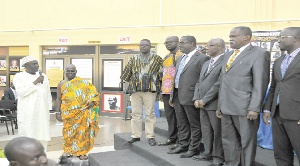The Acting President of Ga Traditional Council in the Greater Accra Region, Nii Dodoo Nsaki II, has called on Ghanaians to ensure environmental cleanliness to avoid any outbreak of disease.
According to the chief, many diseases that people spend money and time to cure could have been avoided if they had ensured environmental cleanliness.
Nii Nsaki II made this call when he addressed a large number of chiefs and people including environmental experts and advocators during the inauguration of Tersus Ghana, an environmental sanitation think tank on Tuesday, June 27, 2017 in Accra.
The think tank which is made up of state officials, academia, non-governmental organisations and environmental experts will provide inputs and guidance for rigorous empirical research that will produce environmental sanitation related information relevant to the sector and the nation as a whole.
Nii Nsaki II who chaired the occasion urged Ghanaians to undertake a periodic communal labour to sweep the beaches and de-silt gutters in their communities.
The chief disclosed that a ban has been placed on using the beach as a place of convenience and that anybody caught would be handed over to the police for prosecution.
“We need to protect our environmental. The government of President Nana Addo Dankwa Akufo-Addo has recognised the importance of improving sanitation standard in our communities, hence the creation of a new ministry of Sanitation and Water Resources,” he stated.
He further emphasized the need for the Ghanaians to work hard to persuade others, particularly politicians and media to environmental issues a priority in their discourse.
For his part, Director of Institute for Environment and Sanitation Studies College of Basic and Applied Science of the University of Ghana, Legon, Prof. Chris Gordon pointed out that, poor environmental sanitation and disregard for the environment was creating a negative image for Ghana.
“But we all know that this is not the true picture of who we are, we were clean and respectful people,” Prof. Gordon stressed.
The Coordinator of Urban Disaster Risk Reduction Programme at the Department of Geography and Resource Development of University of Ghana, Prof. Martin Oteng-Ababio noted that the environmental sanitation has become a major challenge in Ghana due to unavailability of reliable and effective data on the waste management system.
He said it was about time government re-planned the waste management system of the various communities.
He argued that the continued existence of human poverty was due to the failure of ethics and not economics.
Regional News of Friday, 30 June 2017
Source: todaygh.com













